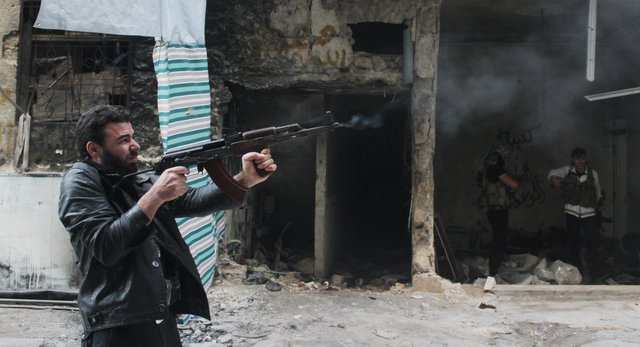It is far too early to tell whether it will have any impact on the ground, but a new Syrian rebel leadership is finally taking form after the splits of this spring.
On February 16, 2014, the Supreme Military Council of the Free Syrian Army (FSA)—an umbrella term for rebels backed by Gulf countries, Turkey, the United States, and some European states—held a surprise meeting to remove its chief of staff, Lieutenant General Salim Idris, and replace him with Brigadier General Abdel-Ilah Bashir al-Nuaymi. Idris contested the election, describing it as “worse than a coup,” and got much of the FSA General Staff to line up behind him. In turn, Bashir was backed by the FSA Supreme Military Council and the Ministry of Defense of the Syrian opposition’s exile government. Reconciliation talks in early March failed to resolve the dispute. The public split has instead deepened, perhaps related to the growing cold war between Saudi Arabia and Qatar.
While Idris made a fuss in the press, still supported by a media team supplied to the FSA by foreign backers, little was heard from Bashir for over a month. But by late March, he began to turn up in the media in his new role as FSA chief of staff. He visited the frontlines in Aleppo and was photographed under a Tawhid Brigade banner (although this large Islamist faction in Aleppo has formally cut ties to the FSA). The exile government also recently released pictures of Bashir visiting the northern coastal region, where there is now heavy fighting, as part of a delegation alongside Minister of Defense Assad Mustafa.
The New FSA Leadership
Meanwhile, a new leadership has been created to replace Idris and his allies, who continue to portray themselves as the legitimate FSA General Staff. Under the auspices of Mustafa and the Ministry of Defense, the following officers have been appointed to “a single central operations room” tasked with running the revolution and the FSA through regional and local branch offices inside Syria:
Minister of Defense: Asaad Mustafa (civilian)
Deputy Minister of Defense: Lieutenant General Mohammed Khallouf
Chief of the General Staff: Brigadier General Abdel-Ilah Bashir al-Nuaymi
Deputy Chief of the General Staff: Colonel Heitham Afeisi
Director of Operations: Staff Brigadier General Zaki Ali Loula
Director of Armaments: Staff Brigadier General Adnan Khutaba
Director of Supplies: Staff Brigadier General Ahmed Ghurra
Director of Reconnaissance: Staff Brigadier General Ahmed Sharrouf
Director of Artillery and Rockets: Staff Brigadier General Abdelmajid al-Dabeis
Director of Organization and Administration: Staff Brigadier General Talal Ferzat
Director of Finances: Brigadier General Ibrahim Darwish
Director of Military Courts: Brigadier General Mohammed Abu Zeid
Director of the Air Force: Staff Brigadier General Salah Bassirini
Director of Signals: Riyad al-Said
Director of Military Intelligence: Staff Brigadier General Yahia Bitar
Director of Chemicals: Brigadier General Khaled al-Omar
Director of Military Engineering: Staff Brigadier General Abdelmajid al-Ashtar
The Role of the Exile Government
It is worth noting that Defense Minister Mustafa and the exile government have played a leading role throughout this process, from the ousting of Idris in February to the appointment of the new leadership in March. When the government was originally elected in November 2013, under the leadership of Prime Minister Ahmad Toumeh, it seemed a toothless creature. But in recent months, the seemingly anarchic restructuring of both international alliances and rebel forces appears to have resulted in closer connections between the government and some—but only some—of the armed groups on the ground.
This applies particularly to the Syria Revolutionaries’ Front, or SRF, a Saudi-sponsored alliance that was formed in December 2013 with the blessing of the opposition’s Ministry of Defense. Fronted by a former construction worker named Jamal Maarouf, the SRF isn’t very ideological and hasn’t produced the slightest semblance of a political program for Syria. When addressing Islamist rebels, Maarouf will sound like an Islamist, but on higher political matters he seems to follow funder guidance without protest, whether that means sending delegates to the Geneva II peace conference or requires aligning with the internationally approved opposition, the exile government, and the new FSA leadership. By now, the SRF has emerged as Syria’s primary anti-jihadi coalition and the backbone of a reinvigorated FSA movement. The SRF’s Heitham Afeisi has accordingly been appointed deputy head of Abdel-Ilah Bashir’s FSA General Staff.
The strategy seems to be the same as always: to bolster a non-jihadi segment of the rebellion inside Syria, consisting of a jumble of unideological, opportunistic, nationalist, and softly Islamist groups, and then connect these factions to a politically pliable exile leadership of defected officers and politicians. Whether it will work this time around is anyone’s guess. But while the primary goal is clearly to give the exile government more clout in future battles and negotiations, men like Maarouf and Afeisi are more likely to benefit in the short run—because while others get titles, they get guns and money.






